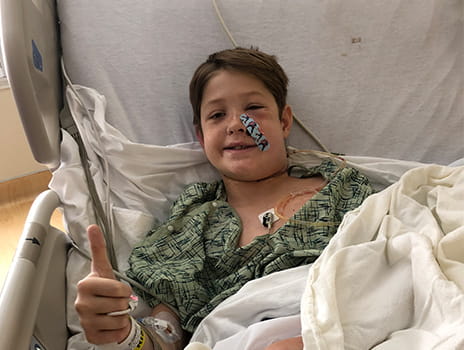Teamwork Enables Safe Removal of Skewer from Child’s Face


April 18, 2019
An afternoon of fun with friends took a sudden and terrifying turn for 10-year-old Xavier Cunningham of Harrisonville, Missouri. A swarm of yellow jackets sent the boys running from the treehouse they were playing in. As Xavier fled, he fell from the ladder – and landed face-first on a meat skewer the kids had found earlier and staked in the ground.
Xavier ran for his mom, the skewer protruding from his face just below his eye.
"I heard screaming, and he came running in with this thing sticking out," says Gabrielle Miller. "I first said, 'Who did this to you?' I thought it was an arrow."
They headed immediately for the local emergency department, where staff took X-rays and ordered an ambulance to take Xavier to Kansas City. He was transferred to a leading children's hospital there, but the pediatric specialists felt even more resources were needed.
"They examined him and thought the best team and the best place to go was The University of Kansas Health System," says Gabrielle.
Xavier was again transferred. His scans were sent to neurosurgeon Koji Ebersole, MD, director of endovascular neurosurgery.
"The images were definitely not something I see every day," Dr. Ebersole says. "I was told he was awake and talking, so it was clear the device, miraculously, didn't hit any brain structures. But getting something lodged at that depth out safely was a very significant concern."
He made a difficult decision – to wait. Xavier had arrived late in the evening, and multiple experts in several specialties needed time to come together and plan for every possible complication.
"We needed to organize all of the resources we have available to optimize Xavier's safety and outcome," Dr. Ebersole says. "There was no set formula for this."
The collaborative approach of an interdisciplinary team gave Xavier the best opportunity for a positive outcome. While the circumstance of Xavier's needs were uncommon, the involvement of multiple board-certified and fellowship-trained specialists was not. It's the approach The University of Kansas Health System team regularly takes to consistently provide patients with the best quality of care.
"This was a one-in-a-million shot," says otolaryngologist Kiran Kakarala, MD. "The skewer was as close as it could be to the big vessels in the neck without damaging them. Our job was to replicate that one-in-a-million shot as we took the device out. We're taught from medical school on that this is a team effort. The old days of the surgeon working alone don't exist anymore. And it's certainly not just the doctors, but a whole huge team of people. We needed all of that help."
In addition to evaluating the unique anatomy of critical structures including the brain, eye, spinal cord and blood vessels, the team had to consider the challenging shape of the skewer itself. The shaft was not round, but square, with sharp edges and a barb at the end – which could be felt at the back of Xavier's head. While the skewer had somehow not caused critical damage upon entry, it could upon removal. Would it slide out freely, or would it have become firmly lodged? The team did not know.
"There was a lot of back and forth about how best to approach the procedure," Dr. Ebersole says. "And what the timing allowed us to do was develop a plan B, a plan C and a plan D. Multiple specialists were prepared for the worst, but fortunately, it turned out for the best."
The extensive care team – about 100 professionals – collaborated and planned, ultimately safely removing the skewer in a 10- to 15-minute surgery.
"Xavier proved to be remarkably brave," Dr. Ebersole says. "This plan would not have worked if he had not been calm. We would have had to do this with less forethought and less planning. His ability to keep calm in a dramatic situation is what helped us finish the task. Now he's going back to a normal life."
Shortly after surgery, Xavier was in bed playing video games, a small bandage alongside his nose the only remaining sign of his ordeal. He said to his mom, "I'm so happy to be alive."
"You would have had no idea that something life-threatening had just happened to him," she says.
She is tremendously thankful to Xavier's care team.
"These are great, wonderful, caring doctors," Gabrielle says. "It felt like a really long time, but I know they were covering everything that could possibly go wrong and making a plan to keep Xavier safe. They were doing the best thing for my baby."
The whole family now views the simple joys of life with a new perspective.
"Life goes on, and we appreciate the little stuff, like Xavier's silly dances, or his just coming in to talk," says Gabrielle. "It all takes on a whole new meaning. It could have been a horrible, sad time for us, but instead, it's joyful and wonderful. He is still with us."
"I see the small things more," Xavier says. "I could have never seen all those things again. So the small things, like … bacon! I'll be like, 'It's so nice. I like this!'"
"It's such a miracle when you hear about it from the doctor's point of view," Gabrielle reflects. "The best feeling was the doctor coming in and saying, 'It's out!' A whole roomful of people cheered."